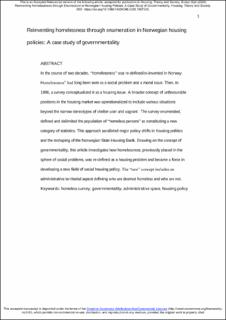Reinventing Homelessness through Enumeration in Norwegian Housing Policies: A Case Study of Governmentality
Peer reviewed, Journal article
Accepted version
Permanent lenke
https://hdl.handle.net/11250/2756949Utgivelsesdato
2020-12-30Metadata
Vis full innførselSamlinger
Sammendrag
In the course of two decades, “homelessness” was re-defined/re-invented in Norway. Homelessness” had long been seen as a social problem and a moral issue. Then, in 1996, a survey conceptualized it as a housing issue. A broader concept of unfavourable positions in the housing market was operationalized to include various situations beyond the narrow stereotypes of shelter-user and vagrant. The survey enumerated, defined and delimited the population of “homeless persons” as constituting a new category of statistics. This approach paralleled major policy shifts in housing politics and the reshaping of the Norwegian State Housing Bank. Drawing on the concept of governmentality, this article investigates how homelessness, previously placed in the sphere of social problems, was re-defined as a housing problem and became a force in developing a new field of social housing policy. The “new” concept includes an administrative territorial aspect defining who are deemed homeless and who are not.

